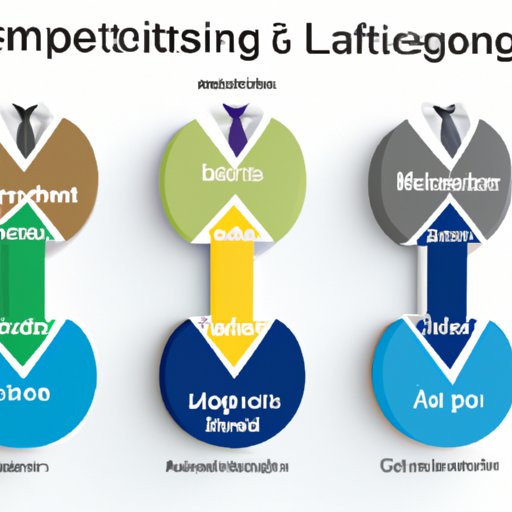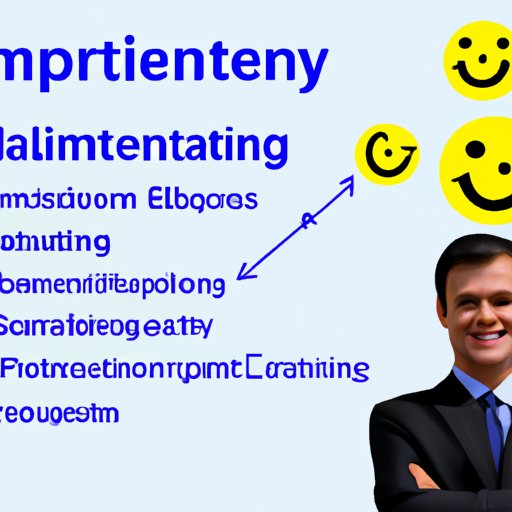Introduction
An effective leader is someone who has the ability to inspire and motivate others to achieve a common goal. They possess strong communication skills, emotional intelligence, and the ability to make difficult decisions. The purpose of this article is to explore what makes an effective leader by analyzing the qualities of successful leaders, examining leadership styles and how they impact effectiveness, interviewing effective leaders to gain insight into their strategies, exploring the role of communication in effective leadership, and investigating the relationship between emotional intelligence and leadership success.
Analyzing the Qualities of Successful Leaders
Effective leaders have certain qualities that set them apart from other people in positions of authority. According to a survey conducted by the Harvard Business Review, “The traits most admired in successful leaders are integrity (86%), decisiveness (85%), and inspiring vision (81%).” Other qualities that are important for successful leaders include being open-minded, having strong problem-solving skills, and having the ability to delegate tasks.
Examples of successful leaders throughout history include Mahatma Gandhi, Nelson Mandela, and Martin Luther King Jr. All three of these men had a clear vision of what they wanted to accomplish and were able to inspire and motivate others to join their cause. They also had the courage to stand up for what they believed in and make difficult decisions when necessary.

Examining Leadership Styles and How They Impact Effectiveness
Different types of leadership styles can be used to manage and motivate people. Some of the most common styles include autocratic, democratic, and laissez-faire. Autocratic leaders make all the decisions and do not involve their team members in the decision-making process. Democratic leaders involve their team members in the decision-making process and encourage collaboration. Laissez-faire leaders give their team members autonomy to make decisions on their own.
Each of these leadership styles has its advantages and disadvantages. Autocratic leaders can make quick decisions, but they may lack creativity and innovation. Democratic leaders foster collaboration and creativity, but they may take longer to make decisions. Laissez-faire leaders give team members autonomy, but they may lack structure and direction.
There are also potential areas of improvement for each leadership style. Autocratic leaders can benefit from involving their team members in the decision-making process, while democratic leaders can benefit from providing more structure and direction. Laissez-faire leaders should focus on providing clear guidance and expectations to their team members.

Interviewing Effective Leaders to Gain Insight into Their Strategies
One way to learn more about effective leadership is to interview successful leaders. When selecting leaders to interview, it is important to consider their experience, accomplishments, and leadership style. After selecting the people to interview, it is important to prepare a list of questions to ask in order to gain insight into their strategies and approaches to leadership.
Questions to ask in interviews include: What inspired you to become a leader? What challenges did you face as a leader? How did you handle those challenges? What strategies did you use to motivate and inspire your team? How did you communicate with your team and ensure everyone was on the same page? What advice would you give to someone looking to become a successful leader?
By learning from the experiences of successful leaders, it is possible to gain valuable insight into the strategies and approaches that lead to success. Through these interviews, it is possible to identify the qualities and characteristics that make these leaders so effective.
Exploring the Role of Communication in Effective Leadership
Good communication is essential for any successful leader. According to a study conducted by the American Management Association, “90 percent of executives surveyed say communication is the single most important factor in achieving organizational success.” Poor communication can lead to confusion, misunderstandings, and low morale among team members.
Effective communication involves listening to team members, offering feedback, and providing clear instructions. Leaders should also strive to be open and honest with their team members and strive to create an environment where different opinions and ideas are encouraged. It is also important for leaders to provide regular updates on progress and ensure that everyone is on the same page.
In addition to communicating with team members, it is also important for leaders to know how to effectively communicate with other stakeholders such as investors, customers, and suppliers. Knowing how to effectively communicate with these stakeholders can help leaders build relationships and ensure that everyone is working towards the same goal.

Investigating the Relationship Between Emotional Intelligence and Leadership Success
Emotional intelligence (EI) is the ability to understand and manage one’s emotions and the emotions of others. According to a study conducted by the University of Michigan, “Leaders with higher levels of emotional intelligence are better able to understand and manage their own emotions and the emotions of those around them.” This helps them to better understand the needs and motivations of their team members and provides them with the ability to make sound decisions.
To increase emotional intelligence, leaders should focus on developing self-awareness, self-regulation, motivation, empathy, and social skills. Self-awareness involves understanding one’s own emotions and how they affect others. Self-regulation involves managing one’s emotions and responding appropriately to different situations. Motivation involves setting goals and taking action to achieve them. Empathy involves understanding and relating to the feelings of others. Social skills involve building relationships and communicating effectively with others.
Conclusion
In conclusion, there are many qualities and strategies that make an effective leader. These include having strong character traits, understanding different leadership styles and how they impact effectiveness, communicating effectively, and having high emotional intelligence. By understanding these qualities and strategies, it is possible to become a successful leader.
This article explored what makes an effective leader by analyzing the qualities of successful leaders, examining leadership styles and how they impact effectiveness, interviewing effective leaders to gain insight into their strategies, exploring the role of communication in effective leadership, and investigating the relationship between emotional intelligence and leadership success.
(Note: Is this article not meeting your expectations? Do you have knowledge or insights to share? Unlock new opportunities and expand your reach by joining our authors team. Click Registration to join us and share your expertise with our readers.)
